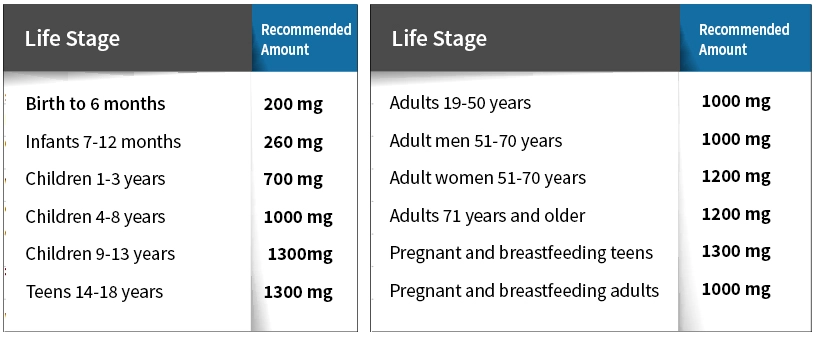Subscribe to get weekly insights
Always stay up to date with our newest articles sent direct to your inbox
Published on 2 Aug, 2023
Updated on 27 Jan, 2025
2888 Views
4 min Read

Written by Care Health Insurance
favorite1Like
Calcium is one of the most essential minerals all living organisms require for survival, including humans. Calcium is abundant in the human body in the form of bones and teeth. Human teeth and bones have 99% of the entire body’s calcium; the remaining 1% is found in blood, tissues, and muscles. Maintaining healthy communication between the brain and other body parts is also necessary. It plays a role in muscle movement and cardiovascular function. Along with calcium, people also need vitamin D, which helps the body absorb calcium. Dairy products such as, green leafy vegetables, nuts, seeds, and fortified goods are a few dietary sources to increase calcium in body.
Calcium plays a vital role in human body to help blood vessels expand and contract. It also contracts muscles to help send messages through the nervous system and allows glands to secrete hormones. Bones are continuously being remodeled, and calcium keeps moving in and out. In children and teenagers, the body builds new bone quicker than it breaks down old bone, increasing total bone mass. This process of forming new bone and breaking down old bone continues until age 30. However, in adults, especially postmenopausal women, their bones are so weak that they break down faster than they build. Also, low calcium intake leads to osteoporosis.
The amount of calcium needed for healthy bones and teeth differs by age. Read on to understand the daily calcium requirement by age and gender-

Plenty of food groups give enough calcium to the body every day. One should be aware that vitamin D rich foods help your body absorb calcium-rich foods.
Below are a handful of guidelines to help you select calcium-rich foods:

The body’s ability to absorb calcium doesn’t stop at a particular age. However, as you get older and reach your mid-30s or 40s, your calcium absorption ability declines. This decline is due to several factors, such as changes in the digestive system, a decrease in stomach acid production, or hormonal changes such as a decrease in estrogen levels in women during menopause. Therefore, some women are prescribed calcium supplements at menopause.
Additionally, at an older age, bones start losing calcium and speed up bone loss, which can lead to osteoporosis. This can lead to weak, fragile, and broken bones, which are more common in women than men.
To maintain adequate calcium levels in the body, consume calcium-rich foods and engage in weight-bearing exercise. Furthermore, maintain Vitamin D in the body, as it plays a vital role in the absorption of calcium in the body.
Calcium is readily available in the foods we eat every day. It is essential to follow a healthy regime to consume optimal amounts of calcium daily rather than entirely depending on supplements.
Those who don’t or can’t follow a healthy regime and get enough calcium from food and beverages each day can take calcium supplements only after being prescribed by a health expert. Also, those who are lactose intolerant or follow a vegan diet find it challenging to have enough calcium so supplements could be their best source of calcium.
>> Also Read: 6 Sources of Iron to Include in Your Diet
Calcium in your everyday diet is considered safe, but excessive calcium through supplements might lead to some health risks. Excessive consumption of calcium may result in constipation, kidney stones, or even calcium buildup in blood vessels, and you could also have trouble absorbing zinc and iron.
Calcium helps children to build strong bones, whereas calcium in adults helps to maintain strong bones. However, inappropriate calcium intake may result in brittle bone diseases such as rickets and osteoporosis, the brittle bone disease. Apart from rickets, osteoporosis, and osteopenia, calcium deficiency may also disrupt the normal function of other bodily processes and metabolic rates. One may experience numbness in toes and fingers, chest pain, muscle cramps, dry skin, tooth decay and brittle nails.
Calcium deficiency is one of the most prevalent mineral deficiencies among all age groups. The deficiency makes you vulnerable to health conditions such as osteoporosis. This condition causes severe, long-lasting pain and disability with a higher risk of death if not treated in time. With this health condition comes the skyrocketed treatment expenses that may cost you a fortune if you aren’t equipped with Care Health Insurance’s most promising health insurance plan that covers osteoporosis under the named ailments by serving a waiting period of 24 months. So, get health insurance post haste and secure your finances during an unforeseen medical crisis.
Disclaimer: Plan features, benefits, coverage, and claims underwriting are subject to policy terms and conditions. Kindly refer to the brochure, sales prospectus, and policy documents carefully.
Thyroid : मामूली नहीं हैं महिलाओं में थायराइड होना, जानें इसके लक्षण और घरेलू उपचार Vipul Tiwary in Diseases
शुगर कंट्रोल कैसे करे? जानें, डायबिटीज में क्या खाना चाहिए Vipul Tiwary in Health & Wellness
हाई ब्लड प्रेशर को तुरंत कंट्रोल कैसे करें? देखें इसके उपाय Vipul Tiwary in Diseases
पैरों में दर्द किस कमी से होता है? जानें, इसके घरेलू इलाज Vipul Tiwary in Health Insurance Articles
Neglecting Oral Health and Hygiene? Your Brain Could Suffer the Consequences Jagriti Chakraborty in Mental Health
Unlock Your Health: Protein Powder for Women and Key Supplements Jagriti Chakraborty in Diet & Nutrition
Forget Yoghurt: 8 Probiotic Foods That Actually Work Jagriti Chakraborty in Health & Wellness
BIG Update: Nipah Virus Is Back, Here’s How to Stay Safe! Sejal Singhania in Health Insurance Articles
Always stay up to date with our newest articles sent direct to your inbox
Loading...